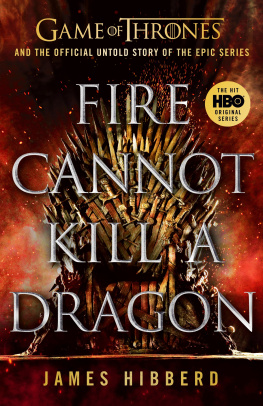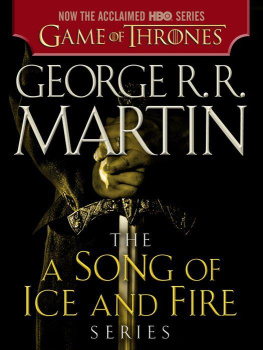

WWW.HBO.COM
Copyright 2014 by HOME BOX OFFICE, INC.
All rights reserved. HBO and related trademarks are the property of Home Box Office, Inc.
Library of Congress Cataloging-in-Publication data available.
ISBN 978-1-4521-2218-2 (HC)
ISBN 978-1-4521-3047-7 (EBOOK)
Designed by Ryan Corey for Smog Design, Inc.
CHRONICLE BOOKS LLC
680 Second Street San Francisco, CA 94107 www.chroniclebooks.com
acknowledgments
Its a strange thing to know in the moment that you are part of something very special. Working on Game of Thrones was, without question, one of the best experiences in my career, due in large part to the exceptional cast and crew that I feel genuinely honored to have worked with. For everyone I bothered repeatedly for quotes, stole time from in the height of the insanity and then returned to with more questions, thank you. I would have included every word if the pages could hold them. I have seen the artistry that goes into every element. I remain in awe.
Particular thanks must go to Frank Doelger, Bernie Caulfield, Chris Newman, Michele Clapton, Tom Martin, Deb Riley, and Tommy Dunne who went above and beyond for me. Special thanks also to Joanne Hall, Ide ORourke, Adam Chazen, Donna Hughes, and Terry Palmer for helping me with constant queries and pulling the most fantastic visuals.
Alanna Riddell, William Simpson, Annick Wolkan, Naimh Currie, Kate McLaughlin, and Steve Collins: You kept me caffeinated and kept me sane.
Helen Sloan and Bryan Cogman: This book would not exist without you and is better for you. You have my marker and my gratitude.
Cara Grabowski at HBO and Sarah Malarkey at Chronicle, who gave me more patience and guidance then I probably deserved.
Lastly, but never least: George R. R. Martin, for creating this epic story and then giving me far more time than you ever needed to help me explore it, I am truly thankful. David Benioff and Dan Weiss, you gave me an opportunity and invited me in to a world I never expected to see. For everything I have learned, I owe you a debt.
I dedicate this book to my mother, Ruth.
Special thanks to: Joshua Goodstadt, Janis Fein, Cara Grabowski, Stacey Abiraj, Tommy Finkelstein, Vicky Lavergne, Susanna Felleman, Robin Eisgrau, Sarah Malarkey, Michael Morris, Lia Brown, Jeff Campbell, Dean Burrell, Beth Steiner, and Johan Almqvist.
Game of Thrones series photographs by principal unit photographer, Helen Sloan.
Additional photography by unit photographers Macall Polay, Keith Bernstein, Neil Davidson, and Nick Briggs; and by Robert Boake, Niall McEvoy, Colin McCusker, Aoife Warren, and Barrie Gower/BGFX.
Costume illustrations by Michele Clapton.
Game of Thrones main title composition by Ramin Djawadi.
Sheet music visual by Ramin Djawadi and William Marriott.
Concept art by Tobias Mannewitz, Anthony Leonardi III, Nick Ainsworth, and Peter McKinstry.
Sept set model by Aoife Warren.
VFX images by Elastic, Pixomondo, SpinVFX.
Slavers Bay map by Jacob Taylor.
foreword
by david benioff and d. b. weiss

David and Dan observing the filming of a key Kings Landing scene.
With every great story there is a beginning. For Game of Thrones, it began with David Benioff and Dan Weiss reading a series of epic novels by George R. R. Martin and, with his hard won blessing, putting together a pitch for the only network they thought could bring the project to life: HBO.
Now, at the end of their fourth successful season, David and Dan revisit that letter and look back over the milestone moments for the series.
C. A. TAYLOR: Reading the pitch letter you sent to HBO in 2006, its clear you knew you had found something special in George R. R. Martins books. You went as far as to bet your careers on the series success. (I think you may have won.) Did you ever imagine that it would be as huge a phenomenon as it has been?
DAVID BENIOFF AND D. B. WEISS: No. We imagined a few different kinds of phenomena that it might be. A thing that would have been really cool if the only place in the world that could do it didnt just say no phenomenon. A well, we just wasted three years of our lives and a thousand gallons of hope on a pilot that tanked and was not picked up phenomenon. A we made a show watched by about a third as many people who would need to watch it to justify its expense phenomenon. But huge phenomenon never seemed a likely contender.
CT: Was there a particular moment when you realized what the show was becoming?
BENIOFF AND WEISS: When (HBO CEO) Richard Plepler first told us, in confidence, that he needed advanced copies of a seasons episodes for the President of the United States. And when a friend sent us a video of the line outside the GoT exhibition in New York. And when our mothers stopped asking if wed found another job yet.
CT: You have often been quoted as saying that one of your main goals for the show was to make it as far as the Red Wedding. What was it about that moment that made it such a key milestone for you?
BENIOFF AND WEISS: Well, the effect it seems to have had on people watching it was the exact same effect it had on us when we first read it. It was perhaps the most powerful feeling a fictional event had ever caused in us. And the thought of bringing that feeling to the screen was very compelling. Basically, we wanted to ruin a lot of peoples months.
CT: Looking back over the first four seasons, is there any key episode, scene, or moment that stands out for you as something you are particularly proud of how it turned out?
BENIOFF AND WEISS: Its impossible to pick one, or two. Weve been lucky enough to work with a ridiculous number of ridiculously talented people, and their combined efforts have provided the show with an embarrassment of riches.
CT: You both directed episodes for seasons three and four. Was this something you always planned on trying and was it difficult to approach the episode as both writer and director?
BENIOFF AND WEISS: The arguments with the writers were very uncomfortable. Those guys are monumental assholes.
We had always planned on trying it, yeah, if we got to the place where the show was working well and we felt comfortable stepping away for the time it took to do it. And its been a tremendous amount of fun. By the time we did it, we were lucky enough to be working with people we knew, loved, and trusted. So it was like being tossed into the deep endbut with arm floaties.
CT: Looking to the future, what do you think your biggest challenges will be with the upcoming series?
BENIOFF AND WEISS: Well, every year things get bigger and more ambitious, on the production level. So moving forward, the challenge will always be to see just how much we can shoot and post in time for next years premiere air date. As far as the story goes... the cast list changes on this show. In the first three seasons, it was largely an issue of dealing with expansions, and how to keep an increasingly large number of characters vital and in-play. From the end of season three, the challenge has changed, somewhatwere in the contraction phase, moving slowly but surely toward an endgame. Now its more about the ways the show evolves in light of the departures of those characters that are no longer with us. Joffreys death, for instancethat changes the dynamics of the shows world drastically.
Next page








